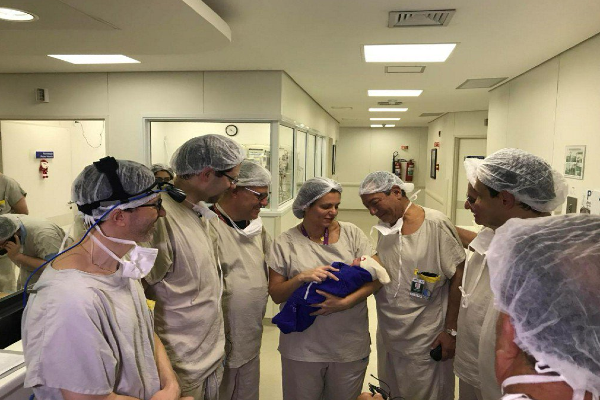A massive medical milestone has occurred as a healthy baby girl was born using a transplanted womb from a deceased person's body.
A ten-hour transplant operation and fertility treatment took place in São Paulo, Brazil; the recipient was a 32-year-old woman born without a womb.
The birth is the first successful case of its kind, doctors have reported.
The case was published in The Lancet medical journal, and involved connecting veins from the donor's uterus to the recipient’s veins, and also linking arteries, ligaments and vaginal canals.
The woman who gave birth had a rare disorder named Mayer-Rokitansky-Küster-Hauser syndrome, which affects about one in every 4,500 women. Those affected by this syndrome experience the failing formation of their vagina and uterus.
However, the womb recipient's ovaries were perfectly formed, therefore doctors were able to remove eggs, and fertilise them with sperm from the father-to-be and freeze the eggs.
39 womb transplants using a live donor have taken place, and has resulted in 11 babies. In some unusual cases, mothers donate their wombs to their daughters.
The previous ten transplants from a deceased donor have unfortunately all failed or led to miscarriage.
The womb donor in the latest Brazilian case involved a womb donor who was a mother-of-three in her mid-40s who died as a result of bleeding on the brain.
The recipient was given drugs which weakened her immune system in order to prevent her body from attacking and then rejecting the womb transplant.
Six weeks following, her periods began, and after seven months, doctors implanted the fertilised eggs. The woman experienced a normal pregnancy, and a 6lb healthy baby girl was born via Caesarean section on 15 December 2017.
Dr Dani Ejzenberg led the research from Hospital das Clínicas in São Paulo, and said: "The first uterus transplants from live donors were a medical milestone, creating the possibility of childbirth for many infertile women with access to suitable donors and the needed medical facilities."
"However, the need for a live donor is a major limitation as donors are rare, typically being willing and eligible family members or close friends."
Dr Srdjan Saso, representing the Imperial College London, claimed the results were "extremely exciting".
The current norm for receiving a womb transplant is that the organ would come from a live family member willing to donate it, but this may all change as a result of this new birth.
Congratulations to the new mother of a beautiful baby girl.







